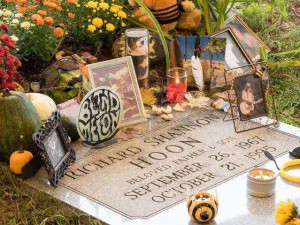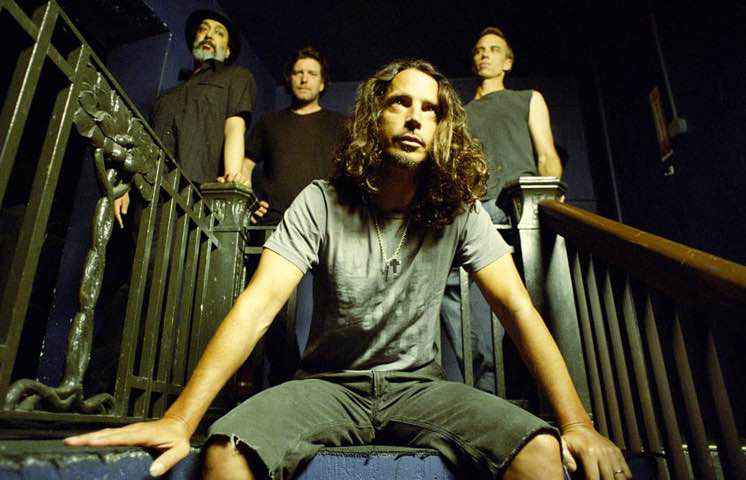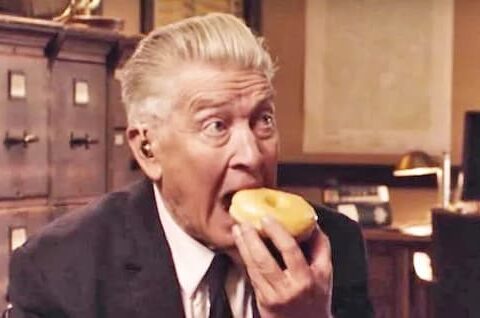On October 21st 1995, the 28 year-old Shannon Hoon was found dead on the Blind Melon tour bus after what was reported to have been a cocaine overdose.
Though I’m a little late with this piece, it was recently the 20th anniversary of Hoon’s premature passing and I couldn’t not find some way to mark it.
I remember Hoon’s death quite vividly. I had only been into Blind Melon for a couple of months, having bought their second and final album, Soup, on cassette tape after hearing an acoustic performance of the single ‘Galaxie’ on a late-night BBC radio show.
I was obsessed with that album for some time, listening to it over and over again. Blind Melon had in fact become my favorite band after Nirvana and Soundgarden; and this was little over a year after Nirvana’s Kurt Cobain had also died.
I also was lucky enough to go see them at the Mean Fiddler in London in September 1995; which, being the age I was at the time, cost me about two months’ worth of allowance.
I also had no way of knowing that he would be gone from this world in just a month’s time. What I do remember most vividly about that show was that it opened with the song ‘2 x 4’ – which was absolutely blistering, even transcendent, to hear live.
And that Shannon seemed really happy and full of life and spirit.
Realising that I was at this point in danger of wearing the Soup tape out from over-play, I soon went and found the band’s first album – 1992’s Blind Melon – and bringing it home, ready for that special moment of listening to it for the first time. Then I remember hearing it announced in the news segment of a BBC Radio 1 rock show that Hoon had been found dead. I then couldn’t bear to listen to the first album, so I put it aside and decided I’d wait until I was ready for it.
The news of Hoon’s death was quite upsetting, particularly as I was remembering an interview I’d read with Hoon only a week or so earlier in which he’d been talking about how happy he was to have just become a father and how enthusiastic he was for the future.
His death was a ridiculous waste of extraordinary talent. Hoon was a singer, poet and personality of immense giftedness and potential, all of which was cut short in October 1995. His band was also a group of musicians whose abilities and creative powers were off-the-scale; and this too was cut short.
Moreover, he and his girlfriend had only just had their first child months earlier; a daughter who he named Nico Blue. And a little girl would have to grow up without a father, while a doting father who was so clearly over the moon at the birth of his daughter would not get to be with her and see her grow up.
All of this was tragic and incredibly bittersweet.

But as the days and weeks went on, what I noticed – and what bothered me – was the lack of reaction to Hoon’s death.
The media didn’t even notice. Other than some comment from Chris Cornell that I remember reading in one of the music magazines, there was pretty much no coverage of him in the mainstream press or entertainment media, and even the rock press and the music press made only passing remarks and paid little tribute. And yet this was the frontman of a band that had sold millions of copies of its debut album and had a single and video – the ‘No Rain’ single – that had played massively on MTV rotation.
Why was there such a deafening silence on his tragic death?
But in fact it was worse than that; because I also recalled that the Soup album, released two months or so prior to his passing, had also received very underwhelming press attention, particularly for an album that was (1) so incredibly good and (2) the follow-up to a very popular, million-plus selling debut.
When popular musicians die, there tends to be an immediate rise in record sales, even if just for a few weeks. This is what happened when Cobain died; it also happened with, for example, Amy Winehouse and Michael Jackson. With Hoon, nothing of the sort occurred, even though Soup was only two months old at this point and many people hadn’t even heard it yet.
The video for Soup’s second single, the bewitching ‘Toes Across The Floor’, reportedly came into MTV’s hands just days before Hoon’s death; yet instead of airing the video as a sort of tribute to Hoon and the band, the video was barely played at all.
This negligence – or more likely, lack of respect – on MTV’s part was extraordinary.
The album Soup itself was an interesting anomaly.
Read more: ‘The Story and Magic of Blind Melon’s ‘SOUP’: The Most Underrated Album Ever…‘
It was a work that was very difficult to define, as it was eclectic and so brave, and it probably wasn’t the commercial release people had been expecting (or that the record company had been hoping for). But it was also severely under-promoted by the record label, allegedly due to some tension during the recording process between the band members and the executives.
Given how remarkable an album Soup is, its under-promotion by the execs was essentially a crime against music, a crime against art.
But that same lack of attention seemed to then go beyond the album and into Shannon’s death too, and beyond the record label and executives and into the apathy of the entertainment industry and press, which was extraordinary.
Something similar could be said for the tragic death of Alice in Chains’ extraordinarily gifted singer, Layne Staley, and his drug-related death in 2002. But Staley died at a point in time in which he hadn’t been musically active for some years already and his severe drug problems were very well known; Shannon Hoon died very suddenly and at the peak of his creative powers, having just released an album and just become a father.
And while you wouldn’t expect Hoon’s death to generate as much coverage as Cobain’s in 1994 (Cobain was undoubtedly a much, much bigger name), one also suspects the manner of Cobain’s death, along with the accompanying ‘soap opera’ of his life and his marriage, might’ve simply made for better ‘copy’ in industries (the entertainment media and even the music press) that was more interested in the drama and novelty than it was in the individual (Cobain or Hoon).
In that context, Hoon’s death from an accidental cocaine overdose might’ve seemed too much of a rock star cliche to bother with.
In all likelihood, however, I suspect the industry and all its sub-industries were simply negligent and completely lost track of special Hoon was, how good his band was, and how remarkable a release that final album was. And when Hoon died, lots of these people – who were invariably more interested in sales than in music or art – simply didn’t know what to say or what to do with it.
I’ve also heard it suggested that after Kurt’s death, everyone was simply fatigued by the matter of dead or ‘tragic’ rock stars and chose not to react.
Not that Hoon himself would’ve cared; what he would’ve cared about far more was leaving a new-born daughter to grow up without her father.
Hoon was by all accounts a larger-than-life character; a time-displaced hippy full of creative and playful energy. He was a prankster and a joker and a natural showman who played the 1994 Woodstock in his girlfriend’s dress while tripping on LSD and who once was arrested for urinating on a fan at a show in Vancouver; but all of this might’ve at times distracted people’s attention from the fact that he was an incredible singer, a superb lyricist and generally an out-of-this-world frontman.
A lot of people for a time only knew Hoon from his friendship with Axl Rose and the fact that he’d appeared on the Use Your Illusion albums and Guns N’ Roses ‘Don’t Cry’ video.
But in fact Hoon was far and away a more talented singer and lyricist than Axl Rose.
Blind Melon is a band that – more than most other bands of the time or even now – really was a delicate equation of first-rate, inspired musicianship from each member. A band as tight and as good as that almost doesn’t even need a great frontman; but they had Shannon Hoon and it was an embarrassment of riches.
In an era of at least a dozen or so genuinely amazing frontmen, Hoon nevertheless shone out as something else. Part of that was in his singular spirit and aura. Some of it was in his fluid, poetic lyrics. Some of it also was in his vocal abilities, which were remarkable.
While we could talk about the sheer, haunting power of Layne Staley’s voice or about Vedder’s deep tones, I’m not sure I’ve ever heard a male rock singer whose voice was as fluid and elastic as Shannon’s – which it probably had to be on account of the band’s ebbing, flowing musicianship and composition.
His voice wasn’t just mellifluous or syrupy sweet; it moved about gymnastically in a remarkable way, as evident on songs like ‘Desserted’ or ‘Time’.
I’ve on and off been a vocalist in bands myself; and while I often used to feel like I could sing in a Kurt like manner or in a Thom Yorke style here or there or like a dozen other vocalists, I’ve never even pretended to try to sing like Shannon Hoon.
While many people used to talk about someone like Jeff Buckley being inspired by or somewhat modelling his vocal powers on the great, late Pakistan Qawwali singer Nusrat Fateh Ali Khan, it is Shannon Hoon who I always feel comes closest to a Nusrat style, spirit and range. That isn’t always evident – it’s dependent on the style of a given song; but you can hear it in something like ‘Dear ‘Ol Dad’, ‘Deserted’ or ‘Paper Scratcher’.

He always seemed to be an almost transcendent figure, like someone whose energies who were too powerful and chaotic for the low-vibrating density of a mundane world – like a Hendrix or a Morrison.
He – a guy who often walked about bare-foot in the streets – also seemed like someone who would’ve been more at home in the late sixties flower-power generation than in the angst-ridden, harder-edged nineties scene. I think actually that, had Hoon and Blind Melon been around in the late sixties, they would’ve been more massive then and much more widely regarded now.
The fact that Blind Melon were probably the one act at the 90’s Woodstock who made it look and feel like 1969 somewhat demonstrates this.
Not that they aren’t highly regarded now: they certainly are among their enduring fan-base, who keep the band’s music and Hoon’s memory alive. And I have also over the years introduced a number of people to the magic of Blind Melon, who invariably come back to me with astonishment at how good those albums are.
And the love for Hoon among those who still hold up a candle to him is as strong as ever.
In regard to what I wrote earlier about Shannon having seemed happy and full of life during that Mean Fiddler show, this actually gets to part of what was especially sad about Hoon’s death.
Unlike Kurt, who was clearly a chronic sufferer of depression and malaise, and unlike Layne Staley, who would later die just as tragically as almost a ghost of his former self, Shannon Hoon seemed full of life, optimism and spirit in 1995.
This was reinforced by an interview I read with him shortly before Soup was released. I think it was with Mick Wall and was in a magazine of the time called Raw. If I ever find it (I’m sure I have it somewhere), I might reproduce some of it online here, as I’ve looked for it on the Internet and haven’t been able to see it anywhere. In it, Hoon seems more happy, more hopeful about life, than I think I’ve ever heard a rock star come across.
But of course he was: he was deeply in love with his partner and was becoming a father, which he was so happy and excited about (the track ‘New Life’ on Soup encapsulates this very powerfully and might be one of the most breathtaking songs you will ever hear).
And yet within a couple of months he was dead. So sad, so senseless.
I’ve never stopped remembering Shannon Hoon, whose high-pitched, raspy, curious voice has been one of the constant musical soundtracks to my life. And it is terrific that filmmaker Danny Clinch is producing a documentary about Shannon. Clinch recently successfully funded a Kickstarter campaign for his upcoming documentary, raising more than $100,000. The photographer, who has also shot concert films for, among others, Pearl Jam and Foo Fighters, is making this documentary around the frontman’s own home-video archive.
According to Clinch, Hoon was a prolific filmer. “In moments of despair, he was filming; in his moments of celebration, he was filming,” the photographer tells Rolling Stone. “He filmed himself cutting his hair, destroying a hotel room, shaving his eyebrows, current events on television. He would set up his camera in, like, the big shower of a hotel room because the acoustics were really good and rehearse a new song. He was just filming all the time.” One of the lighter moments Clinch came across was footage of a naked Hoon delivering a pizza to Guns N’ Roses mid-performance.
I also only fairly recently made myself watch the Letters From a Porcupine movie (having hesitated for a long, long time because I thought it would be too emotional), which was frankly a wonderful record of a moment in time and of a band at the height of its powers.
I would also hope that new generations will discover or be shown to those albums and to an appreciation of Hoon’s singular talents. It will be a great voyage of discovery for them.
______________
Read more: ‘The Story and Magic of Blind Melon’s ‘SOUP’: The Most Underrated Album Ever…‘
See all music posts.
______________





Absolutely well done. A true believer writing a beautiful piece of about Shannon is rare indeed. Most critics and “content” providers write the typical “one hit wonder” narrative oozing sneering contempt. Robert Plant, Jimmy Page and Jagger have only complimented one 90s era band (all 3 I mean) and that band was Blind Melon. A band that’s as talented as any of the greats , and were gone too soon. (Orig lineup) I can’t tell you how great it was, reading a piece by a critic that actually knew the band and material they were reviewing . Devoid of any lazy cliches and even mentioning deeper cuts that stand up to any 90s material and even beyond. Health and happiness to you brother. Stay aerodynamic af.
Thanks for the kind words, bro. I actually have BM songs playing in my head when I’m trying to sleep: that’s how much that music is in my consciousness. Do you have a favorite song?